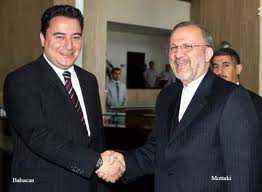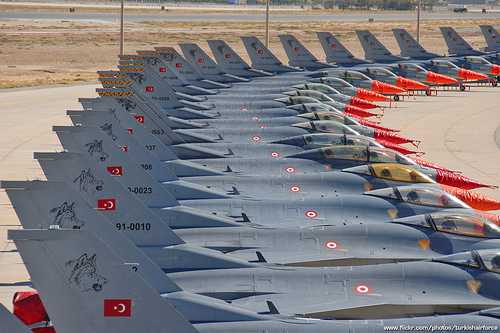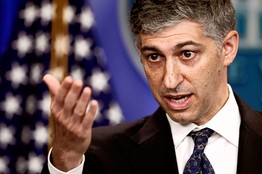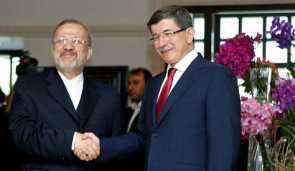A senior U.S. official is set today to begin talks aimed at encouraging Turkey and Azerbaijan to curb their economic ties with Iran over the Middle Eastern nation’s disputed atomic work, the Wall Street Journalreported today (see GSN, Oct. 19).
U.S. Treasury Undersecretary Stuart Levey is expected to launch his meetings with officials and private-sector leaders in Baku, Azerbaijan. He would later hold additional meetings in Istanbul and Ankara.

“We’re looking to follow up on the steps needed to implement the latest United Nations sanctions against Iran and to share information, especially with the private sector, about threats posed by Iranian illicit conduct,” Levey told the Journal last week. The U.N. Security Council has imposed four sanctions resolutions aimed at pressuring Iran to halt atomic activities that could support bomb development, and the European Union and various countries have followed up with independent penalties.
Turkish Prime Minister Recep Tayyip Erdogan, though, last month vowed within five years to achieve a threefold boost in business with Iran, which has insisted its nuclear program is strictly nonmilitary in nature.
Azerbaijan might emerge as a critical gasoline exporter to Iran as other nations seek to prevent Tehran from buying refined oil products from abroad, according to the Journal (Solomon/Champion, Wall Street Journal, Oct. 19).
A number of Iranian foreign policy achievements in recent weeks highlighted the limitations of U.S. efforts to isolate the country, Agence France-Presse reported. Iran was named president of the Organization of Petroleum Exporting Countries, its president paid a high-profile visit to Lebanon and the Obama administration acknowledged the country’s importance in the pacification of Afghanistan.
“The United States cannot restrict Iran’s role in the region,” said Mohammad Saleh Sedghian, who heads the Tehran-based Arab Center for Iranian Studies. “The policy of economic sanctions may have succeeded to some extent, but it cannot succeed in isolating Iran in the Middle East.”
“Given the timing, these achievements can be considered as a success for Iran … and nobody disputes Iran’s influence in the region,” one Western diplomat added.
“But the key issue for Tehran is the damage the sanctions are doing to its economy,” the diplomat said. “That is what will make its nuclear policy increasingly expensive” (Agence France-Presse I/Spacewar.com, Oct. 19).
China today reaffirmed its determination to implement Security Council penalties against Iran, Reuters reported. The Obama administration last month presented to Beijing a “significant list” of financial institutions and other firms in the country believed to be breaching sanctions against Tehran.
“The Chinese side has always advocated that every country should implement the relevant U.N. resolutions about the Iran nuclear issue comprehensively, accurately and seriously,” Foreign Ministry spokesman Ma Zhaoxu said.
“We think it is not only good to maintain the integrity of the nonproliferation regime, but also peace and stability in the Middle East,” Ma said. “China has fully fulfilled its international responsibilities and actively participated in diplomatic efforts in this regard. We have expressed our stance to the U.S. side” (Blanchard/Yan, Reuters I, Oct. 19).
The United States and Israel yesterday cited the Iranian nuclear standoff as a significant priority, AFP reported.
“While today’s strategic dialogue covered many subjects, it is clear that Iran is among the greatest challenges we face today in the Middle East,” the nations said in released remarks at their semiannual strategic talks.
“Iran’s continued noncompliance with its international obligations related to its nuclear program, as well as its continued support for terrorist entities, are of grave concern to our two countries and the entire international community,” they said.
“Continued efforts by the international community to address Iran’s actions through both pressure and engagement are critical to changing Iran’s strategic calculus and preventing Iran from acquiring a nuclear weapons capability,” the statement said (Agence France-Presse II/Google News, Oct 18).
Iran could face more severe economic penalties over its nuclear program or even an Israeli air attack on its atomic facilities, Reuters yesterday quoted former U.S. State Department nonproliferation analyst Mark Fitzpatrick as saying. He offered the thoughts ahead of possible nuclear talks next month between Iran and world powers China, France, Germany, Russia, the United Kingdom and the United States.
“We could be in an out and out crisis in a year’s time,” said Fitzpatrick, now with the International Institute for Strategic Studies in the United Kingdom.
“My worry is that Iran won’t overtly cross the line, but that it will miscalculate how close it can get before it crosses an Israeli tripwire,” said Fitzpatrick, who suggested Tehran might not have to begin converting its uranium stocks to nuclear-weapon material in order to prompt military action by Jerusalem.
“I’m not sure Iran knows where Israel’s tripwires are. I’m not sure Israel knows where its tripwires are,” the expert said.
Iran’s longer-range Sajjil missile suggests the country could seek nuclear weapons, Fitzpatrick added (seeGSN, Sept. 22).
“Iran’s the only country that has developed these kind of missiles with a range of 2,000 kilometers or more that hasn’t developed nuclear weapons at the same time. So that’s another reason why there’s concern about Iran’s intention,” he said (Simon Cameron-Moore, Reuters II, Oct. 18).
Pakistan’s top diplomat, though, yesterday contended Tehran lacks a rationale for acquiring a nuclear deterrent, AFP reported.
“I don’t think they have a justification to go nuclear,” Pakistani Foreign Minister Shah Mahmood Qureshi said. “Who’s threatening Iran? I don’t see any immediate threat to Iran.”
Qureshi noted he has encouraged Manouchehr Mottaki, his Iranian counterpart, to take advantage of President Obama’s attempts at diplomatic outreach on the nuclear standoff.
Iran is barred from developing nuclear weapons under the Nuclear Nonproliferation Treaty, Qureshi added. “They have an international obligation. They have signed [the] NPT and they should respect that,” the Pakistani official said (Agence France-Presse III/Spacewar.com, Oct. 18).
 WASHINGTON – Turkey on Wednesday rebuffed a U.S. effort to persuade it to scale back its trade ties with Iran, despite a persistent U.S. lobbying campaign this week in Washington and Ankara.
WASHINGTON – Turkey on Wednesday rebuffed a U.S. effort to persuade it to scale back its trade ties with Iran, despite a persistent U.S. lobbying campaign this week in Washington and Ankara.




![U.S. Envoy to Meet With Iran's Neighbors 9 [USIRAN]](http://sg.wsj.net/public/resources/images/WO-AD021_USIRAN_NS_20101018190047.gif)

